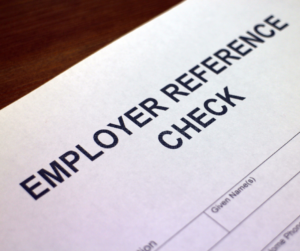 As you map out your hiring process, determine how many references you will require and how you will verify those. In our litigious society, most employers are reluctant or unable to give out any more than the standard: “We can verify the dates of employment, the position, and the salary, but nothing more.” This protects everyone except you, the potential employer. I once hired an hourly employee I had recruited through an agency. Both the agency and I had checked the candidate’s references, yet I ended up having to let her go for some serious indiscretions on her timecards. When I did a little detective work afterward, I found out that all of her references were friends or previous coworkers, not managers. Clearly neither the recruiter nor I had done enough due diligence.
As you map out your hiring process, determine how many references you will require and how you will verify those. In our litigious society, most employers are reluctant or unable to give out any more than the standard: “We can verify the dates of employment, the position, and the salary, but nothing more.” This protects everyone except you, the potential employer. I once hired an hourly employee I had recruited through an agency. Both the agency and I had checked the candidate’s references, yet I ended up having to let her go for some serious indiscretions on her timecards. When I did a little detective work afterward, I found out that all of her references were friends or previous coworkers, not managers. Clearly neither the recruiter nor I had done enough due diligence.
While former employers might be reluctant to give you more than the standard answer, I do always ask: “Would you rehire this person?” It is legal for former employers to answer this question truthfully, and the answer can tell you volumes about the candidate. You can also try to contact someone else in the company. Or ask to talk to a former client or vendor, someone who can affirm that this person has really done what they say they’ve done. The bottom line is, get proof! For salespeople, I’ve often asked for W-2s to verify earnings. I’ve heard too many stories from salespeople about how they were on quota making big bucks, only to find out after hiring them that they were about to be fired for nonperformance.
If you do get someone on the phone who is willing to talk about the candidate’s work performance, always let them know you would only like about five minutes of their time. Ask if that’s okay with them. Once they say yes, get them chatting. You’ll pick up more than you thought. Only ask questions related to the behavioral traits you’re looking for. And be sure to thank them for their help.
If you’re hiring someone who is currently employed, verifying current employment can be more difficult because the candidate may not want their employer to know they are interviewing for a new position. Go back to the previous company and check those references. The candidate might also be able to give you the name of someone else at their current company who could at least verify the candidate’s position and duties.
Finally, be aware that great performance at a very large corporation or government entity may not translate into a great performance at a smaller firm of one hundred employees. There is inherently more structure at large companies—albeit with varying degrees of functionality—and someone used to that type of environment might have a difficult time translating their skill set successfully to a smaller, more hands-on, or entrepreneurial setting. Again, values and culture matter. Ask candidates about their own, and those of their former employers. Ask references questions about values and culture as well.
At this point, you’ve screened, tested, interviewed, ranked, and scored all your candidates and should be able to choose which candidate you want to hire. Make the offer! And please, do this in writing. Because conversations can be misunderstood, it’s just better for everyone to have the details down on paper.
Excerpted from my book, “Putting Together the Entrepreneurial Puzzle: The Ten Pieces Every Business Needs to Succeed.” Available here on Amazon.
